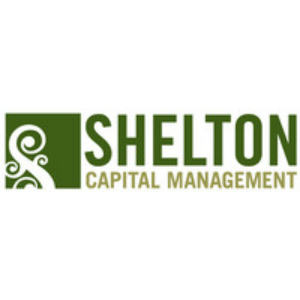Shelton Capital Management says it distinguishes itself by identifying high-quality assets both in the market and the workplace. Shelton is a registered investment advisor (RIA) that serves a variety of clients from individuals to institutional entities such as large businesses and charitable organizations.
Shelton Capital Management Background
Shelton Capital Management first kicked off operations in 1985. It formed as a limited partnership (LP) under Claifornia law. However, its main base of business is in Denver, Colorado. It’s owned by RFS Inc., which in turn is owned by a family trust. Stephen C. Rogers serves as the firm’s current CEO and co-trustee to the family trust.
Shelton Capital Management Client Types and Minimum Account Sizes
Formed in the 1980s, the firm manages assets for individuals with and without high net worth, as well as investment companies, pension and profit sharing plans, charitable organizations and corporations.
Shelton Capital Management minimum account sizes range from $100,000 to $1,000,000, depending the investment strategy. The firm or affiliates will determine minimum account requirements on a case-by-case basis.
Services Offered by Shelton Capital Management
Shelton Capital Management primarily delivers investment advisory services through separately managed account programs. It may provide investment advice directly to the client’s account or serve as a sub-advisor to an investment account sponsored by a different financial services entity.
In addition, the firm can extend its services to ERISA plans and non-ERISA accounts.
Shelton Capital Management Investment Philosophy
Shelton Capital Management may utilize a variety of strategies to help its diverse clientele meet their various investment goals. In doing so, it may turn to fundamental research, charting analysis, cyclical analysis or technical analytical tools.
These methods collectively involve analyzing companies, sectors, industries and global economies to make investment decisions. The firm draws from the information it gathers to help their clients meet long-term goals. In doing so, the firm may invest across several different asset classes including equity and fixed income.
Shelton Capital Management Fees
Fees charged by Shelton Capital Management vary, depending on the needs of the client, any applicable portfolio restrictions and the account’s distribution channel.
Clients engaging in the firm's investment advisory services typically pay between 0.30% and 1.5% depending on the total assets under management in the Wrap or UMA program.
According to a 2018 study of 1,500 firms by RIA in a Box, the average financial advisor's investment advisory fee is 0.95% of AUM. The firm's fees are generally charged as a percentage of assets under management (AUM). At its discretion, Shelton Capital Management may negotiate a minimum fee arrangement.
What to Watch Out For
As of the time of this writing, Shelton Capital Management had no disciplinary events to disclose. For the latest information, you can access its Form ADV via the website of the Securities and Exchange Commission (SEC).
Shelton manages multiple funds with different fees, objectives and time horizons. Because the advisor must allocate his or her time across different funds, the advisor may be incentivised to devote more effort to funds charging higher fees. However, the firm upholds a code of ethics that reinforces the advisors’ duties as fiduciaries. This means their foremost priority is working in the best interests of their clients.
Opening an Account With Shelton Capital Management
To contact Shelton Capital Management, call (800) 955-9988.
All information was accurate as of the writing of this article.
Tips for Finding the Right Financial Advisor
- A financial advisor can help you plan and manage your assets. Finding a qualified financial advisor doesn’t have to be hard. SmartAsset’s free tool matches you with up to three financial advisors who serve your area, and you can interview your advisor matches at no cost to decide which one is right for you. If you’re ready to find an advisor who can help you achieve your financial goals, get started now.
- When considering financial advisors, ask whether they have any certifications. The certified financial planner (CFP) designation, for example, requires advisors to work as fiduciaries. This means they must always provide advice in your best interest or face legal penalties. To learn more, read our article on the top 10 financial certifications.

